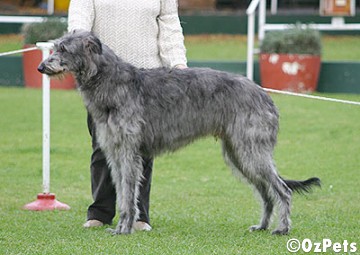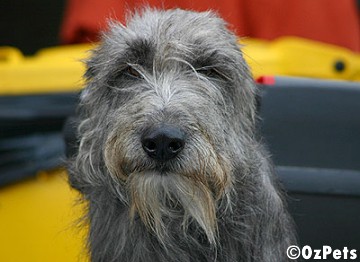
THE DEERHOUND The Deerhound is a very large aristocratic breed that resembles a rough coated Greyhound of larger size and bone. His hunting origins have shaped his form to a perfect combination of speed, agility, and courage. They may not be suited to everyone as they need a large space, regular exercise and have a hearty appetite. They are a faithful companion, very courageous and though sometimes wary of strangers are unlikely to bark and growl when someone approaches the front door rather meet them with a long sniff. They are an extremely dignified, sensitive and gentle dog.
The Deerhound is a very large aristocratic breed that resembles a rough coated Greyhound of larger size and bone. His hunting origins have shaped his form to a perfect combination of speed, agility, and courage. They may not be suited to everyone as they need a large space, regular exercise and have a hearty appetite. They are a faithful companion, very courageous and though sometimes wary of strangers are unlikely to bark and growl when someone approaches the front door rather meet them with a long sniff. They are an extremely dignified, sensitive and gentle dog.
The adult Deerhound is prone to laziness, though this is obviously not good for them and they should be regularly exercised. The lifespan of the Deerhound is on average about 9 years for bitches and 8 years for males. Deerhounds have the usual large breed health problems but not to the extent of the other large breeds. They have a harsh wiry coat about 7-10 cm long, it is softer on the head, belly, and breast. The coat requires minimal grooming but it does shed. The colourings of the Deerhound are a dark blue/grey, dark or lighter greys and brindles with black points.
They have a harsh wiry coat about 7-10 cm long, it is softer on the head, belly, and breast. The coat requires minimal grooming but it does shed. The colourings of the Deerhound are a dark blue/grey, dark or lighter greys and brindles with black points.
Deerhounds have a hunting origin so must be socialised as a puppy in order to introduce them properly to other small animals. Deerhounds are generally great with children though they are not a dog to be roughed and tumbled with.
In summary an amazing dog, but only a lifestyle suited to extensive exercise will suit as the Deerhound is almost impossible to tire on a walk. Deerhounds are a wonderful companion dog, preferring human company as often as possible. Whatever you are doing, they like to be with you and fit in well with your life considering their size. Deerhounds seem to have an inbuilt instinct on where to find all the comfortable spots in the house and make very good in-door dogs if permitted. However, if they are to remain outdoor dogs, a cosy, warm kennel, shed or suitable place needs to be provided for your dog, free from draughts with a warm blanket or piece of carpet for a bed. This should not be too far from the house as Deerhounds like to be close to the family and will feel rejected if banished to the far end of the yard. Sunshine, light and a shaded area are most important considerations for the healthy growing pup and a secure fenced yard must be provided as Deerhounds have almost no road sense and think traffic has to stop for THEM. Be prepared to see your growing pup jump over the metre high fence you carefully built for him last month!
Deerhounds are a wonderful companion dog, preferring human company as often as possible. Whatever you are doing, they like to be with you and fit in well with your life considering their size. Deerhounds seem to have an inbuilt instinct on where to find all the comfortable spots in the house and make very good in-door dogs if permitted. However, if they are to remain outdoor dogs, a cosy, warm kennel, shed or suitable place needs to be provided for your dog, free from draughts with a warm blanket or piece of carpet for a bed. This should not be too far from the house as Deerhounds like to be close to the family and will feel rejected if banished to the far end of the yard. Sunshine, light and a shaded area are most important considerations for the healthy growing pup and a secure fenced yard must be provided as Deerhounds have almost no road sense and think traffic has to stop for THEM. Be prepared to see your growing pup jump over the metre high fence you carefully built for him last month!
Most Deerhounds like to jump and think nothing of clearing the average garden fence or even higher. So be warned. Your new puppy will be quite upset initially , being away from the rest of the litter for the first time, so for the first few nights the warmth of a hot water bottle wrapped in a towel can provide security and comfort until he adjusts to his new surroundings .